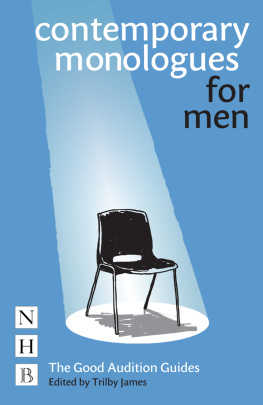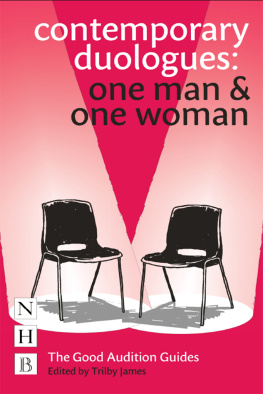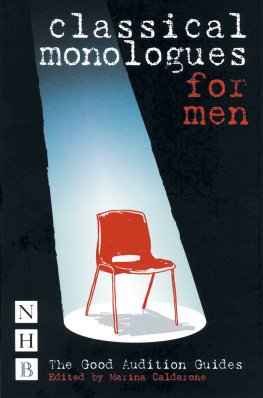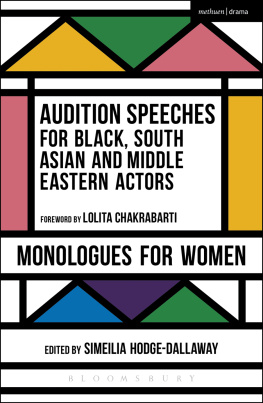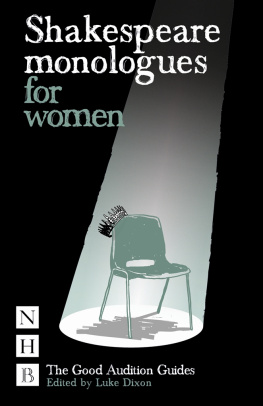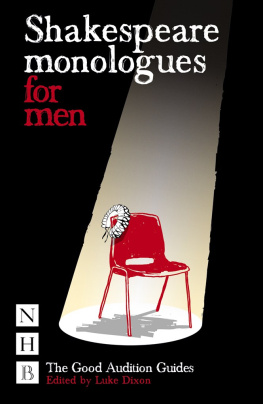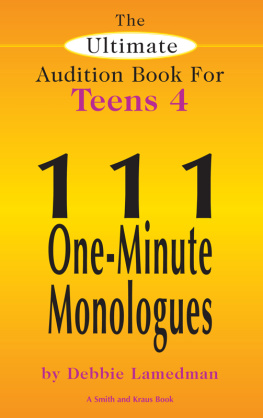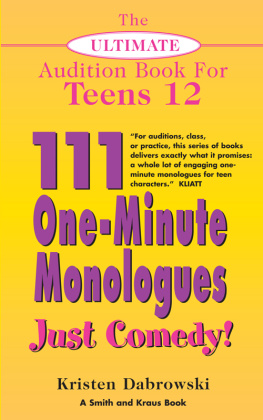Trilby James - Contemporary Monologues for Men
Here you can read online Trilby James - Contemporary Monologues for Men full text of the book (entire story) in english for free. Download pdf and epub, get meaning, cover and reviews about this ebook. year: 2014, publisher: Nick Hern Books, genre: Detective and thriller. Description of the work, (preface) as well as reviews are available. Best literature library LitArk.com created for fans of good reading and offers a wide selection of genres:
Romance novel
Science fiction
Adventure
Detective
Science
History
Home and family
Prose
Art
Politics
Computer
Non-fiction
Religion
Business
Children
Humor
Choose a favorite category and find really read worthwhile books. Enjoy immersion in the world of imagination, feel the emotions of the characters or learn something new for yourself, make an fascinating discovery.
- Book:Contemporary Monologues for Men
- Author:
- Publisher:Nick Hern Books
- Genre:
- Year:2014
- Rating:4 / 5
- Favourites:Add to favourites
- Your mark:
Contemporary Monologues for Men: summary, description and annotation
We offer to read an annotation, description, summary or preface (depends on what the author of the book "Contemporary Monologues for Men" wrote himself). If you haven't found the necessary information about the book — write in the comments, we will try to find it.
THE GOOD AUDITION GUIDES: Helping you select and perform the audition piece that is best suited to your performing skills
In this volume of the Good Audition Guides, youll find fifty fantastic speeches for men, all written since the year 2000, by some of our most exciting dramatic voices.
Playwrights featured in Contemporary Monologues for Men include Howard Brenton, Jez Butterworth, Alexi Kaye Campbell, Caryl Churchill, Ariel Dorfman, Ella Hickson, Lucy Kirkwood, Bruce Norris, Jack Thorne and Enda Walsh, and the plays themselves were premiered at the very best theatres across the UK including the National Theatre, the Donmar Warehouse, the Bush and the Young Vic, Manchester Royal Exchange, Birmingham Rep, the Traverse in Edinburgh, and many on the stages of the Royal Court.
Drawing on her experience as an actor, director and teacher at several leading drama schools, Trilby James prefaces each speech with a thorough introduction including the vital information you need to place the piece in context (the who, what, when, where and why) and suggestions about how to perform the scene to its maximum effect (including the characters objectives and keywords).Contemporary Monologues for Men also features an introduction on the whole process of selecting and preparing your speech, and approaching the audition itself. The result is the most comprehensive and useful contemporary monologue book now available.
Sound practical advice for anyone attending an audition a source of inspiration for teachers and students alike Teaching Drama Magazine on The Good Audition Guides
Trilby James: author's other books
Who wrote Contemporary Monologues for Men? Find out the surname, the name of the author of the book and a list of all author's works by series.

